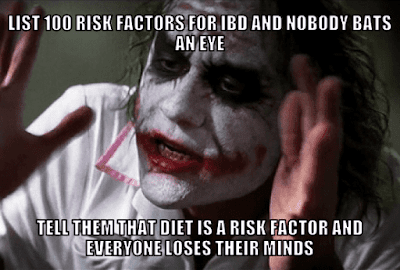“Evidence of diet modulating intestinal inflammation comes mainly from mice studies. An elegant mice study published in 2018 examined the effects of 32 custom diets on susceptibility to colitis in mice free of both specific pathogens and germs. A high-protein diet—especially containing casein, soy protein and whey protein—led to increased colitis severity, which was assessed through weight loss in mice."
Maybe this is not new for patients, but it’s also good to remember how our diet can impact on IBD symptoms and its evolution. IBD can mean making some changes to your diet. You may need to avoid certain foods to help your symptoms, or take extra care to make sure you’re getting the right nutrients. There’s no single diet that works for everyone as the list of products that can trigger the disease can vary from one person to another. Everyone is different so what works for one person may not work for another. However, there is a general feeling that IBD patients should avoid irritant substances such as chocolate, coffee, spicy food, ginger, alcohol, greasy food, food rich in purines, fast food in general… Depending on the symptoms, they should also avoid or increase the intake of fibre, maybe diary products, cereals… But as said, this should be personal and based on how the patient reacts after eating those products. If cutting out a food makes no difference to your symptoms, make sure you start eating it again to avoid missing out on important nutrients.
If you want to know more about this fascinating study, you caqn visit their link:


Muy útil para quiénes padecemos tu na de estas patologías
ReplyDeleteGracias! :)
Delete